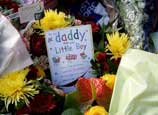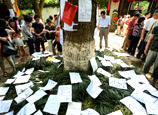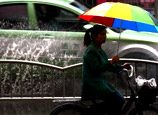
Schooling row
A graphic instance is the schooling row that erupted in Shanghai last year. Due to hukou, the children of migrants cannot participate in local university and high school entrance exams. They have to travel back home to sit the grueling tests, a requirement that many perceive as unfair.
Prompted by a migrant schoolgirl's online campaign for what she called "equal rights to education," many people last year attacked Bei Shang Guang for shutting the door on migrants and reserving their prestigious schools, arguably the nation's best, disproportionately for the locals. It is a lot harder for a student from, say, Henan Province, to be admitted to Tsinghua and Peking universities, practically China's Harvard and MIT, than for his or her Beijing counterpart. While such arrangements do favor residents of Bei Shang Guang and are rigged against migrants, they are fiercely supported by the locals who refuse to yield ground to migrants.
While there is some relaxing of hukou locally, its sweeping reform is highly complicated and thus a long way off. Drastic measures to waive it will open the floodgate for mass migration, to the chagrin of city managers concerned about stability and provision of public goods.
But harmony is not the only category in which Bei Shang Guang did poorly. They also lagged behind in government openness, transparency and good governance. This was a surprising conclusion, as the country's most cosmopolitan cities, their officials are believed to be more open-minded and liberal.
The fact that Bei Shang Guang was unseated from positions of glory by a few second- and third-tier cities in the bluebook has spawned controversy. After all, the latter's need for population to fuel their growth has naturally prompted schemes to relax hukou as part of their charm offensive to woo talents. But does that more equal treatment bring "harmony"? Not necessarily.
Xinhua reported last year that after many fled Bei Shang Guang, only to find more nepotism back home, they return to the big cities where upward mobility entails greater efforts and less cronyism. The situation is reminiscent of acclaimed writer Qian Zhongshu's novel, "Wei Cheng,"("Besieged City") in which the writer famously says "people within the city want to leave it, while people from without want to get in."
For all the partiality of its criteria, in general the bluebook is a progressive development, in that it assesses the achievements of urban China from a brand new perspective, takes into account more human-interest factors like equal opportunity and interpersonal relationships, instead of the usual keywords of industrial output, GDP and growth rate.


















 Couple say 'I do' after 35-year wait
Couple say 'I do' after 35-year wait


![]()
